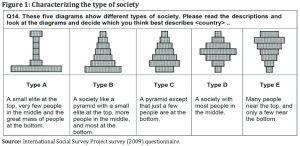Misperceiving Inequality
< < Go Back
Vast literature suggests that economic inequality has important political consequences.
Higher inequality is thought to increase demand for government income redistribution in democracies and promote class conflict and revolution in dictatorships. Both arguments assume that ordinary people know how high inequality is, how it has been changing, and where they fit in the income distribution.
A National Bureau of Economic Research study, using a variety of large, cross-national surveys, shows that, in recent years, ordinary people have had little idea about such things.
– What they think they know is often wrong.
– Widespread ignorance and misperceptions of inequality emerged robustly, regardless of the data source, operationalization, and method of measurement.
The study also shows a perceived level of inequality — not the actual level — correlates strongly with demand for redistribution and reported conflict between rich and poor. The study suggests that most theories about political effects of inequality need to be either abandoned or reframed as theories about the effects of perceived inequality.
More From NCPA:




